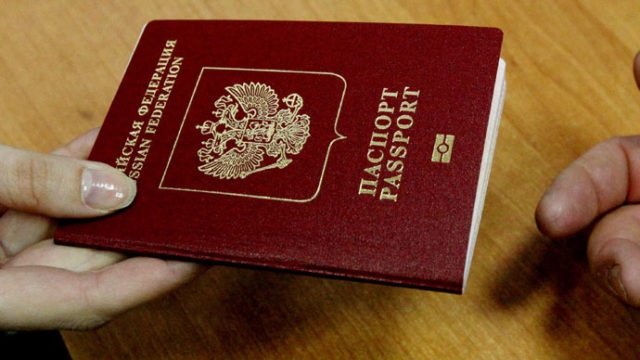
Russia Launches ‘Passportization’ in Occupied Ukrainian Donbas (Part One)
Publication: Eurasia Daily Monitor Volume: 16 Issue: 63
By:

On April 24, Russian President Vladimir Putin issued a decree—with immediate effect—simplifying the procedure for granting Russia’s citizenship to residents of “certain areas of Ukraine’s Donetsk and Luhansk provinces” (Kremlin.ru, April 24), i.e., the Russian-occupied territory in Ukraine’s Donbas. Those residents are, by legal definition (since 1991), citizens of Ukraine on Ukraine’s territory; but Putin’s decree intends to supplant their Ukrainian citizenship. This decree is the latest in the series of Russia’s legislative and economic moves to wrest these areas from Ukraine in real terms and incorporate them de facto—but not yet officially—into Russia. This is Russia’s third “passportization” project, after those in the Russian-occupied territories of Georgia (Abkhazia and South Ossetia) and Moldova (Transnistria).
On May 1, Putin followed up with a similar decree, covering citizens of Ukraine who formerly resided in those same Donetsk and Luhansk areas, as well as in Crimea, but moved to Russia since 2014 and are currently residing there. They, too, are made eligible for receiving Russia’s citizenship through the simplified procedure (Kremlin.ru, May 1). The cut-off dates for eligibility are April 2014 for former residents of the Donetsk-Luhansk areas, and March 2014 for former residents of Crimea (those dates mark the start of military operations in Donetsk-Luhansk and the Russian annexation of Crimea, respectively).
“Certain areas of Ukraine’s Donetsk and Luhansk provinces” is the Minsk “agreements’ ” euphemism for the Russian-occupied territory. Under Putin’s decree, residents of those areas are to apply for Russian citizenship at offices of Russia’s Internal Affairs Ministry (MVD). The applicants need to show identity documents issued by the Donetsk and Luhansk “authorities” (only Russia recognizes those documents as valid). Applicants are not required to renounce their Ukrainian citizenship. The Russian MVD offices are to examine the applications, administer the oath of Russian citizenship, and issue Russian passports to these new citizens, within a period of maximum three months from the submission of the application (Kremlin.ru, April 24).
According to Russian MVD’s Main Directorate on Migration, the “simplified” procedure means not only a shorter waiting time (it would take much longer normally), but also that Donetsk-Luhansk applicants are not required to show permits for temporary or permanent residency in Russia as a prerequisite to receiving citizenship.
The MVD or other Russian institutions will not go into the Donetsk and Luhansk “People’s Republics” (DPR, LPR) to take applications and distribute passports there. Nor will “DPR-LPR” residents go to Russia to apply and pick up passports there. Instead, the MVD has just opened two application-processing and passport-issuing centers (one for each “republic”) in Russia’s nearby Rostov Oblast (Interfax, April 29).
The “DPR’s” and “LPR’s” “migration services” shall take applications for Russian citizenship from local residents, carry batches of applications to the two centers just across the border on Russia’s territory, and then carry batches of Russian passports back to the “DPR-LPR,” where local residents will individually pick up their new Russian passports (Donetskoye Agentstvo Novostey, Lugansk Infotsentr, April 26–April 30).
These procedures help to maximize the number of applicants by, practically, thrusting Russian passports in their lap (“only the lazy will not take this,” goes the Russian phrase). Politically, through this procedure, Russia pretends that it is not violating international laws that forbid changing the citizenship of populations in occupied territories, even if the grant of Russian citizenship in this case itself confirms the fact of the occupation.
Recipients of Russian citizenship in “DPR-LPR” are not asked to renounce their Ukrainian citizenship. However, Ukraine’s Law on Citizenship rules out dual citizenship. Citizens of Ukraine must renounce Ukrainian citizenship if they acquire the citizenship of another state. For its part, Russia undoubtedly wants its newly baked citizens in Donbas to maintain their Ukrainian citizenship and the right to vote in Ukraine’s elections, in case the territory is returned to Ukraine on the Russian-designed Minsk terms. Those terms envisage local elections to be staged in the Russian-controlled Donetsk-Luhansk territory, followed by the territory’s full return to the Ukrainian political system. The combined effect would solidify the Russian control locally and create a substantial pro-Russia bloc holding the balance in the Ukrainian parliament.
Approximately four million people are estimated to have resided before 2014 in the part of Donbas now under Russian control. The current number is definitely less, but not conclusively estimated. Refugees from the war have moved in part to Russia and in part to Ukraine’s interior.
Applying for Russian citizenship is not necessarily an indicator of political motivation, nor of a well-considered or internalized allegiance to the Russian state on the part of the applicant. Those factors will be at work in a limited number of cases. Rather, the applicants’ primary motives will undoubtedly be to qualify for Russian old-age pensions, to find employment in Russia, to study in Russia, to seek business opportunities in Russia, and (for many of those involved in war crimes) to be certain of impunity.
Putin personally anticipates that one third of the number of applicants will be pensioners (TASS, April 27), but he has not indicated what he expects the overall number of applications to be.
Passportization in this territory will not be immediate or total. Russia’s previous mass- passportization program, undertaken in Abkhazia and South Ossetia, lasted six years (2002–2008) and helped pave the way for the military invasion of Georgia. The passportization process is currently at the half-way point in Moldova’s Transnistria. The Kremlin is using a gradualist approach to passportization, both as a political-diplomatic tactic and considering the limitations on Russia’s resources.
In the Russian-controlled Donbas, passportization will likely proceed in stages. Locally recruited military personnel and Russian-installed civilian officials will probably be given priority to receive Russian citizenship. The distribution of Russian passports to local military personnel started before the publication of Putin’s decree (RFE/RL, Nastoyashcheye Vremya, April 24).



